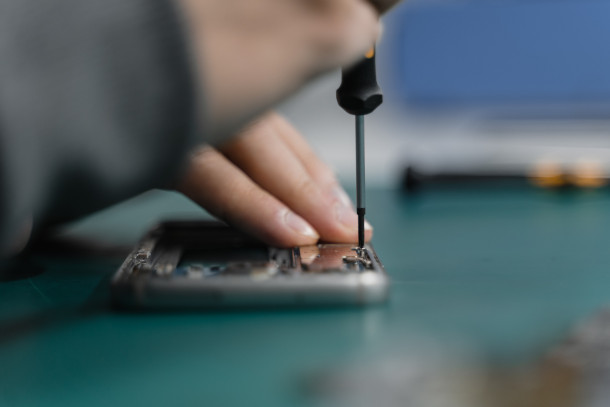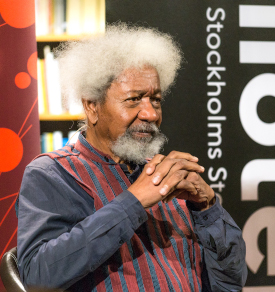Beyond the Headlines
Air Date: Week of October 20, 2023

Culdesac in Tempe, Arizona is designed as a car-free neighborhood. They do not offer parking spaces for residents. (Photo: Steve DiMatteo on Unsplash)
This week, Living on Earth contributor Peter Dykstra joins Host Aynsley O’Neill to describe a car-free community in Arizona that could serve as a model for more sustainable development. Also, a new Right to Repair law in California is projected to cut down on e-waste. And in history, they look back to the first Nobel Prize in Literature awarded to an African, Wole Soyinka, who wrote about the environmental degradation in a postcolonial Niger Delta.
Transcript
DOERING: It’s Living on Earth, I’m Jenni Doering
O’NEILL: And I’m Aynsley O’Neill.
O'NEILL: It's about that time in our show where we take a look beyond the headlines with our Living on Earth contributor Peter Dykstra. He's joining us now from Atlanta, Georgia. Hi, Peter. What do you have for us?
DYKSTRA: Hi, Aynsley. My first story is about a place in the suburbs of Phoenix, Arizona, that purports to be a subdivision that will be the first walkable, car-free subdivision in the nation. It's called Culdesac. It's in the suburban town of Tempe, also home of Arizona State University. And the thing that kind of raised my eyebrows a bit, is that if you're going to have a car-free, outside-friendly place, is Phoenix the best place to start when it's over 100 degrees for almost the entire summer?
O'NEILL: Yeah, it's pretty toasty down there. But I mean, a car-free neighborhood, we don't have a ton of those here in the US. That sounds pretty exciting to me.
DYKSTRA: No, it may be a stretch, but certainly it's a good development, where it's happening anywhere. Culdesac will cover 17 acres when it's complete. It's about half done now. And some of the first residents out of the thousand people they expect to live there have already moved in.
O'NEILL: Well, an interesting starting point, but hopefully we'll see some more of those spread throughout our country.
DYKSTRA: If you can make it there in hot Tempe, Arizona, you can make it anywhere. So let's wish them well.
O'NEILL: Well, you've got that right, Peter. But what else do you have for us this week?
DYKSTRA: In California, there's a new law called the Right to Repair Act. It sounds like something that only geeks could love. It allows consumers who have consumer electronics they now have to send back to the manufacturer to engage in home repairs to get parts or have an outside expert deal with those electronics. It's projected to save Californians about $5 billion a year, but also keep some of that three quarters of a million tons of electronic waste out of the landfill, and also reduce the amount of mining for precious metals. That is one of the environmental sore points for the electronics industry.

California’s new right-to-repair law is a landmark for consumer rights. (Photo: Tima Miroshnichenko, Pexels)
O'NEILL: A win for the techies and a win for the environment. Sounds good to me, Peter. And what do you have for us from the history books?
DYKSTRA: Well, there's been an ongoing environmental crisis in Nigeria for many years. But on October 16th, 1986, a playwright from Nigeria, Wole Soyinka became the first African to win the Nobel Prize for literature. His play "The Swamp Dwellers" dealt with the Ogoni people, many of whom live in the Niger Delta. And that Delta region has also been a hotbed of oil activity. The oil companies, particularly Royal Dutch Shell, stand accused of ruining some of the mangrove swamps in the Niger Delta and causing distress among the Ogoni people. Another writer, Ken Saro-Wiwa, led much of the movement for justice for the Ogoni people. But in 1995, the authoritarian Nigerian government allegedly framed Saro-Wiwa and eight other activists for a murder. They were convicted and hanged. Ken Saro-Wiwa is now a martyr. Wole Soyinka is now a Nobel Laureate. They both have given strength to this movement that resulted in a huge settlement from Royal Dutch Shell. But the pollution problems there persist.

Nigerian playwright Wole Soyinka won the Nobel Prize in Literature in 1986. (Photo: Frankie Fouganthin, Wikimedia Commons, CC BY-SA 4.0)
O'NEILL: Well, sounds like both the protests and the Nobel Prize win were pretty important landmarks for environmental justice in Nigeria.
DYKSTRA: Indeed they were.
O'NEILL: Well, thank you for bringing us those stories, Peter. Peter Dykstra is a Living on Earth contributor. Thanks again and we'll talk to you soon.
DYKSTRA: Okay, Aynsley. Thanks a lot and we'll talk to you soon.
O'NEILL: And there's more on these stories on the Living on Earth website. That's LOE.org.
Links
The Guardian | “‘People Are Happier in a Walkable Neighborhood’: The US Community That Banned Cars”
Quartz | “California’s Tech Sector Will Soon Have to Contend With a New Right-to-Repair Law”
Living on Earth wants to hear from you!
Living on Earth
62 Calef Highway, Suite 212
Lee, NH 03861
Telephone: 617-287-4121
E-mail: comments@loe.org
Newsletter [Click here]
Donate to Living on Earth!
Living on Earth is an independent media program and relies entirely on contributions from listeners and institutions supporting public service. Please donate now to preserve an independent environmental voice.
NewsletterLiving on Earth offers a weekly delivery of the show's rundown to your mailbox. Sign up for our newsletter today!
 Sailors For The Sea: Be the change you want to sea.
Sailors For The Sea: Be the change you want to sea.
 The Grantham Foundation for the Protection of the Environment: Committed to protecting and improving the health of the global environment.
The Grantham Foundation for the Protection of the Environment: Committed to protecting and improving the health of the global environment.
 Contribute to Living on Earth and receive, as our gift to you, an archival print of one of Mark Seth Lender's extraordinary wildlife photographs. Follow the link to see Mark's current collection of photographs.
Contribute to Living on Earth and receive, as our gift to you, an archival print of one of Mark Seth Lender's extraordinary wildlife photographs. Follow the link to see Mark's current collection of photographs.
 Buy a signed copy of Mark Seth Lender's book Smeagull the Seagull & support Living on Earth
Buy a signed copy of Mark Seth Lender's book Smeagull the Seagull & support Living on Earth

